Abortion providers’ main legal challenge to Texas’ six-week abortion ban is effectively over: A ruling Friday by the Texas Supreme Court will keep Senate Bill 8 in effect indefinitely.
The law, which appears to violate the abortion rights protections established in 1973 by Roe v. Wade, has been in effect since September 1 and has forced thousands of Texans to travel out of state for abortions.
The law has survived legal challenges because of its unusual structure. Instead of criminalizing the procedure after six weeks, it deputizes private citizens to sue anyone who “aids or abets” the provision of such an abortion, with successful plaintiffs receiving a minimum of $10,000.
The U.S. Supreme Court has declined to block the law. In December, it ruled that abortion providers could challenge the law, but only on very narrow grounds. The Supreme Court’s conservative majority ruled abortion providers could sue state medical licensing officials — health boards, for example — that are empowered to penalize health care providers who violate the abortion ban. But in a loss for the providers, the justices said they could not sue state officials who helped process the civil lawsuits that constitute SB 8’s main penalty.
At the time, legal experts suggested that the decision significantly weakened abortion providers’ odds of eventually getting the law blocked. And the Friday decision from the Texas Supreme Court suggests they were right.
After ruling on SB 8, the U.S. Supreme Court relegated the case back to a lower federal court, the U.S. Court of Appeals for the 5th Circuit. That court was asked to reconsider a question that the Supreme Court appeared to have settled: whether abortion providers could in fact sue state medical licensing officials. If the answer was no, there would be no state entity abortion providers could sue, and no avenue for them to challenge the law in court and seek a ruling blocking its enforcement.
At the end of January, the 5th Circuit, in a 2-1 decision, sent the case to the Texas Supreme Court. In a decision released Friday, that court dealt a blow to the state’s abortion providers, finding that medical licensing officials don’t actually enforce the state’s abortion ban.
The decision has effectively blocked a significant pathway for abortion providers to challenge the law in its totality. Providers can challenge individuals who sue under SB 8. Lawsuits are also pending in the state court.
The decision comes at a critical moment for abortion rights law. The U.S. Supreme Court is weighing a challenge to Roe v. Wade, and expected to issue a ruling this summer that could weaken federal abortion protections. In anticipation, conservative-led state are pushing forth bills that would further restrict abortion access.
Oklahoma and Idaho’s state Senates have passed bills that would emulate Texas’ six-week ban. Those bills have yet to be voted on by the respective Houses or signed by the governor. But Friday’s decision could encourage them to move forward with such bills, by signaling that a Texas-inspired abortion ban is likely to stay enforced and successfully survive legal challenges.
Leah Litman, a constitutional law expert at the University of Michigan, said the ruling could impact how policymakers in other statehouses think about the enforcement component.
“It basically provides more incentives to states to adopt laws like SB 8 in order to insulate their laws from judicial review and allow states to put in place laws that nullify people’s ability to exercise constitutional rights without having to defend those laws in court,” she said.
The decision could have an impact on other kind of bills moving through statehouses, Litman said. In Missouri, two bills have been introduced that would ban ectopic pregnancies and traveling out of state to obtain abortions. Both use a similar punitive structure to Texas’ six-week abortion ban.
“There’s just no reason to think that this enforcement structure and these implications are going to be limited to the context of abortion bans after six weeks,” she said. “Which makes the implications all the more troubling.”





